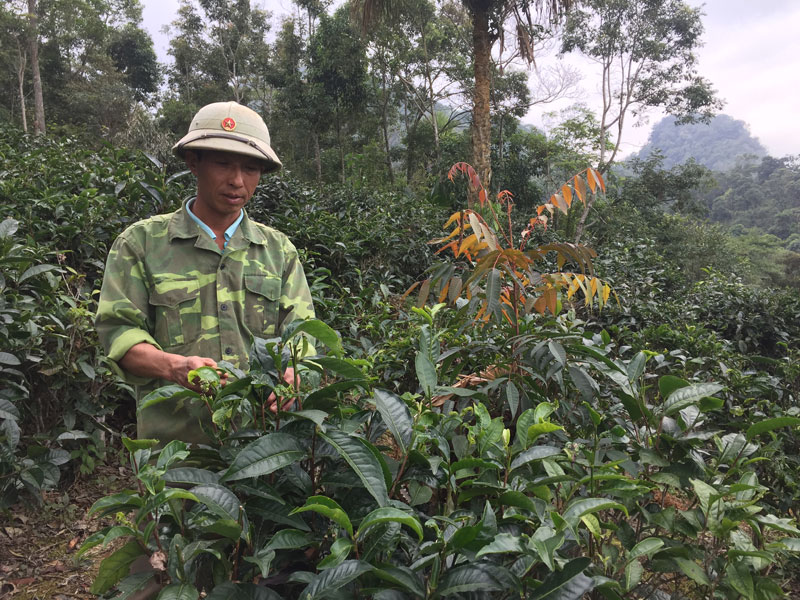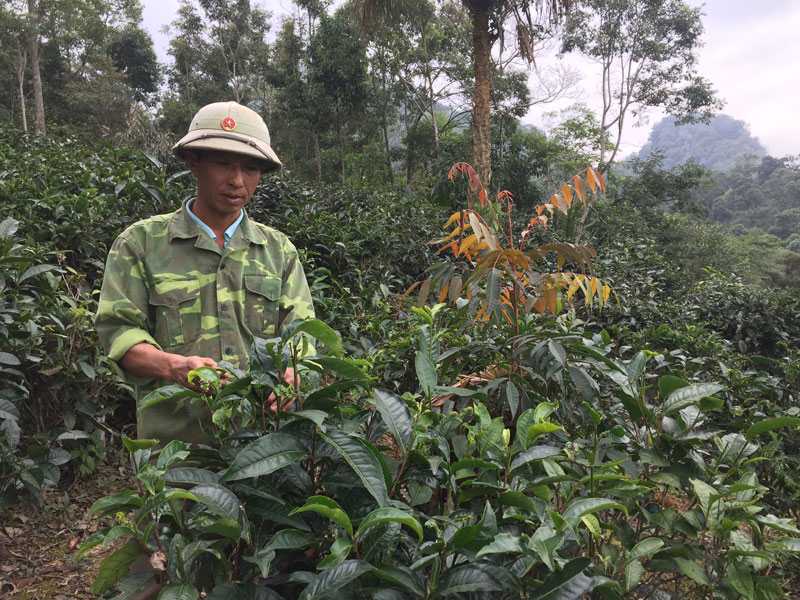
(HBO) - Trung Thanh commune in Da Bac district has maintained 97.9 ha cultivated with two rice crops a year, 160 ha under maize and 80 ha of cassava in accordance with plans. The local animal husbandry also expanded to 16,000 cattle and poultry heads, and 2.2 ha of aquaculture. Meanwhile, the Shan Tuyet tea is considered a key product to help sustainably reduce poverty in the locality. Currently, the Shan Tuyet tea trees are grown on 70 ha of land in Bua, Thuong, and Bay hamlets, of which trees on 40 ha can be harvested.

Thanks to the cultivation of Shan Tuyet tea, Ha Van Pom's family in
Thuong hamlet, Trung Thanh commune (Da Bac) has become better off with higher income.
We
visited Ha Van Pom's family in Thuong hamlet, who have more than 15 years of experience in cultivating Shan Tuyet tea.
Currently, Pom
and his family members are busy taking care of their tea plants, as harvest time is approaching.
Taking us around the tea hill, Ha Van Pom
said: "Compared to maize, Shan Tuyet tea bring us a higher profit at lesser labor costs.
Currently, my family's tea farmhas been expanded to 1 ha. Everyday, three members of the family can collect about 100kg of fresh tea leaves.
The price is stable at 6,000 VND per kg, and each month we earn about17 million VND.The harvest seasonlasts from March to November.”
In
order to facilitate the local
economic development, the commune has cooperated with the
district Bank for Social
Policy to effectively implement
preferential lendingprogrammes, with outstanding debts totalling14.4 billion VND. Training courses on
cultivation and animal husbandryhave been organised annually, attracting 500
participants so far.
In 2018, the Poverty Reduction Project provided 420 million VND to 32 poor households to help them improve livelihoods.
The Vice Chairman of the Trung Thanh People's Committee said that in the coming
time, the commune plans to
continue persuading locals to engage in Shan Tuyet tea cultivation, while working
with enterprises for distribution of tea products.
He also asked for support from public agencies,
sectors and organizations in terms of saplings, capital, and production techniques
to boost product quality.
The commune will continue working to maintain
and expand effective cultivation and animal raising models, thus helping locals
raise income and living standards and achieving sustainable poverty reduction.
The emulation movement "Hoa Binh joining hands to build new-style rural areas” has been widely spreading, becoming a driving force that motivates the localities to renew rural landscapes and improve the material and spiritual lives of the residents. In this movement, the people play a central role-both as the main implementers and direct beneficiaries of its outcomes.
In response to the global digital revolution, Hoa Binh Newspaper is transforming itself into a modern and multi-platform media hub, blending cutting-edge technology with a restructured newsroom and a new generation of tech-savvy journalists.
Hoa Binh province’s Association of the Elderly recently held a conference to review the project on expanding the inter-generation self-help club model until 2025.
In a move to implement Resolution No. 57-NQ/TW, issued on December 22, 2024 by the Politburo, which targets breakthroughs in science-technology development, innovation, and digital transformation, the Hoa Binh provincial Department of Health has issued a plan to roll out the "Digital Literacy for All” campaign within the local health sector.
An Nghia Commune (Lạc Sơn District) is one of the communes that achieved the tha standard of the national new rural area in 2018. Entering a new development phase, the commune is now trying to meet the criteria for the advanced new rural development. With the strong political will and the public consensus, the commune is gradually overcoming the challenges to reach this goal, aiming for the sustainable development.



